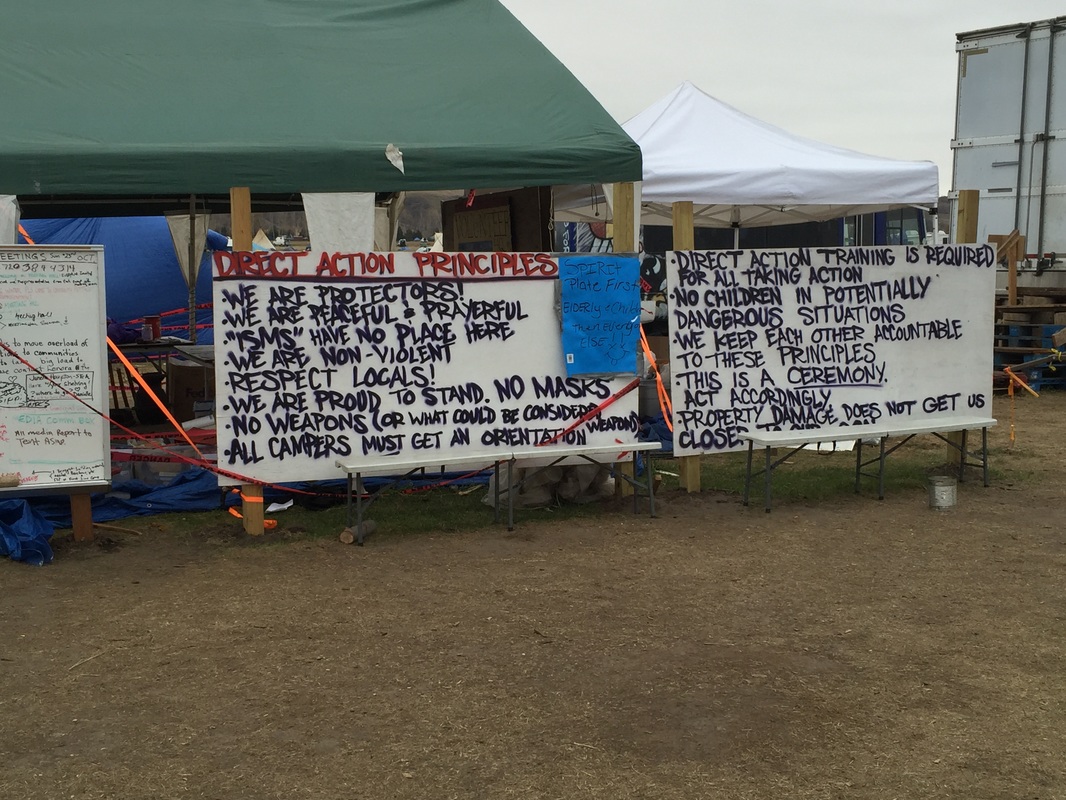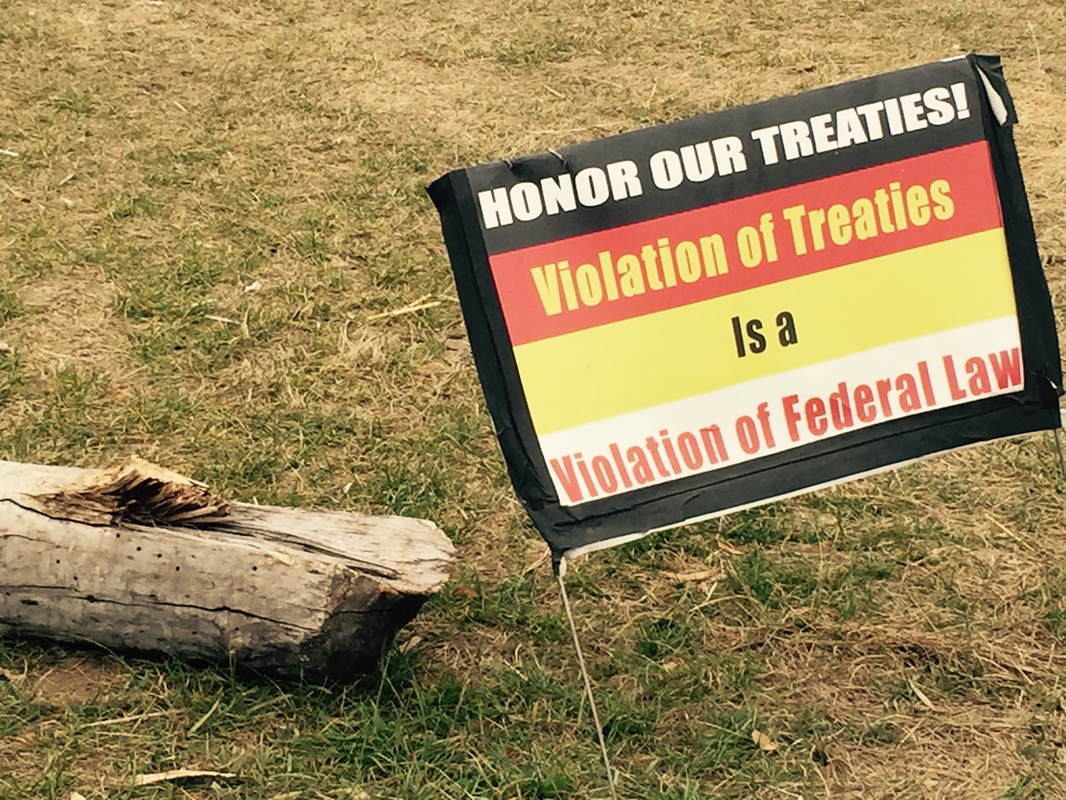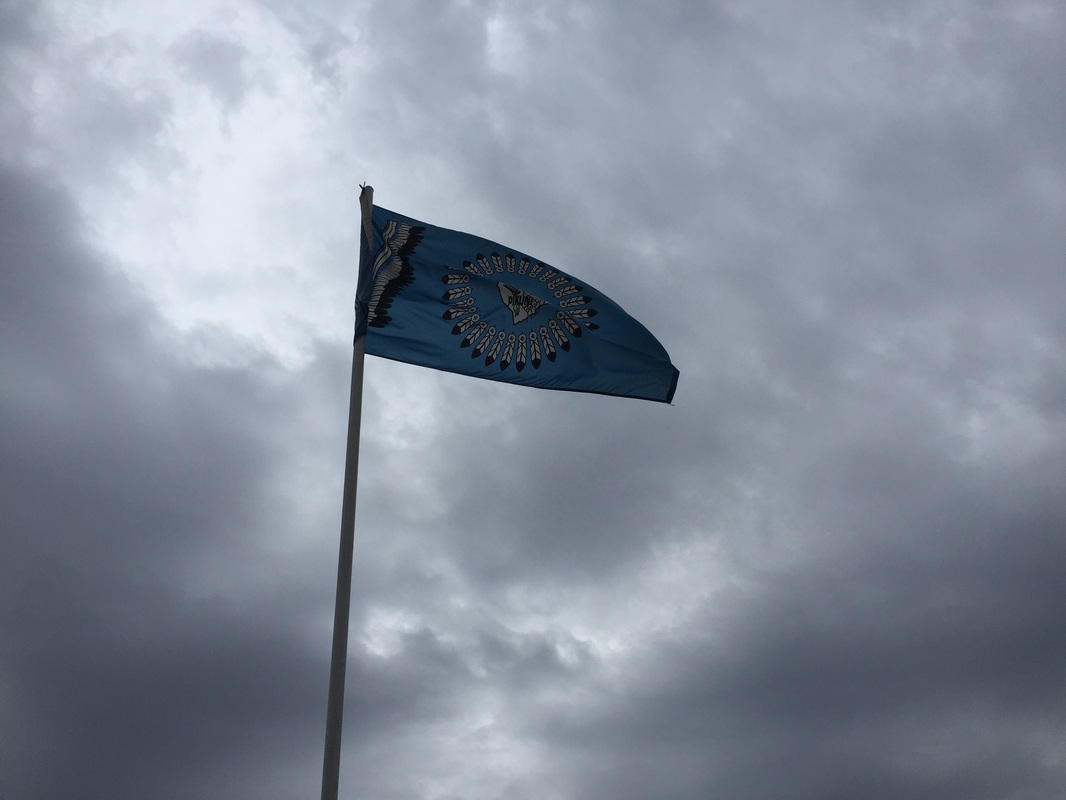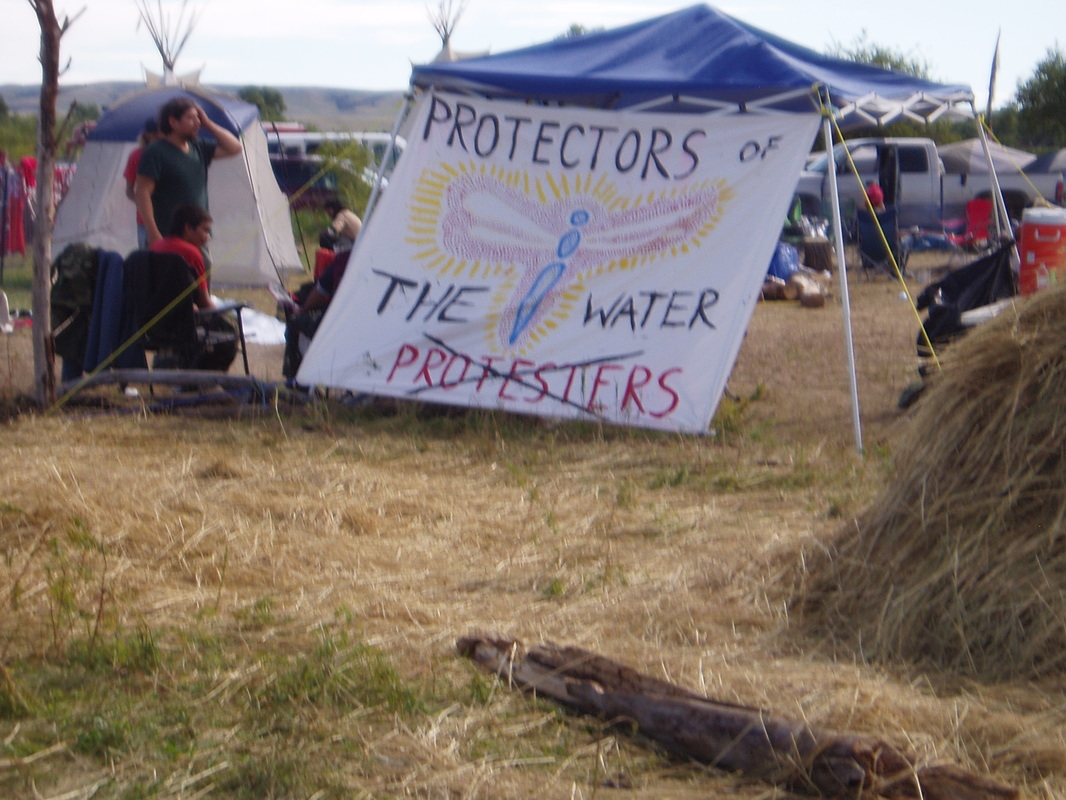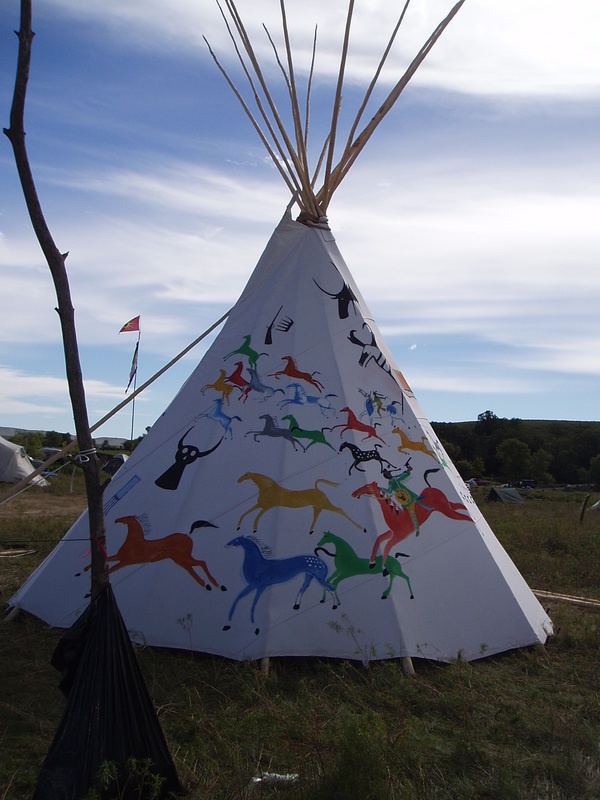Deepen Faith and Witness - Reflections on Standing Rock: Protest, Protect, Pray, Presence10/26/2016 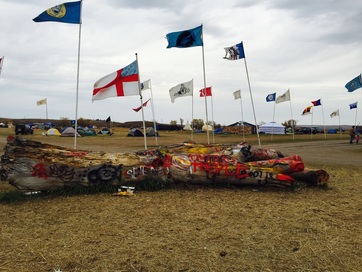 Oh, the layers of complexity at Standing Rock! Indigenous rights, property disputes, law enforcement, energy policy, environmental priorities, water rights, racial justice, jurisdictional ambiguity. And on and on and on. What's a church to do? I know that for some the answer is clear: "Stay out of it!" There are some who think the church should simply stay away. But many disagree. This week a group of ELCA leaders (6 bishops, 2 leaders of the Native American Lutheran Association and a group of local pastors and lay people) visited Standing Rock. We talked with tribal leaders, with people in the encampments, and with law enforcement officers. All of our conversations were civil, everything we did was surrounded by prayer. Nobody wants this thing to blow up. Everyone wants a peaceful settlement, especially the people who will continue to live there, both tribal and non-Indian, after the pipeline dispute is over. Why is this our business? In 2016, both the Montana Synod and the ELCA Churchwide Assembly adopted a Repudiation of the Doctrine of Discovery, which, among other things, pledged to walk with the tribes in their quest for justice. And in 2010, the Montana Synod adopted an Apology to the tribes of Montana, and promised to stand with them in the future. In short, this is our business, because we pledged accompaniment. This is also our business because it is not simply a local dispute. It is not simply about one pipeline on one piece of land. The vigil at Standing Rock has become a defining moment for Native Americans in understanding what it means to be both American citizens and members of a sovereign nation. A history of broken treaties, unkept promises, land and water disputes, assimilation, genocide, poverty, and racism has drawn advocates, sympathizer and witnesses to come to Standing Rock. It's like a Rosa Parks moment for American Indians. Enough. People have come from all over the world. There are 320 flags along "Avenue of Flags." I found myself standing under the Episcopal Church flag, just a couple of flags away from the flag of the Blackfeet Nation. Many people assume that what is going on at Standing Rock is protest. There are certainly elements of that. And there are some people there whose primary agenda is protest. But not the vast majority. The whole response to the proposed pipeline began last spring with prayer. A group of tribal members gathered on a hill overlooking the Missouri and prayed together for a long time. Not a quick pro forma blessing, but extended prayer. Prayer continues to be the bedrock of this movement. Everywhere we went we were asked to pray--with law enforcement, with pilgrims, with tribal leaders. The separation of church and state that we cling to so fiercely in the rest of civic life was simply not an issue. This is a deeply spiritual movement. Tribal leaders see their goal not as protest, but as protection--protection of the river, protection of the earth, protection of future generations. Protest is focused on being against something. Protection is focused on being for something. So what is a group of bishops doing there? Presence. We followed in the footsteps of many faith leaders from other denominations and faith groups by simply showing up. By bringing coats and hats and blankets and firewood, by praying, by listening and simply by being there.  As faith leaders we do not have the power to direct the Army Corps of Engineers or to stop the private security company's surveillance helicopters. We do not have the authority to set up roadblocks or enforce treaties. But we do have the power of prayer, and we do have the power of presence. Jessica Crist, Bishop
3 Comments
Note: This is part of a series on the Social Statements adopted by the ELCA in Assembly. Previous reflections are available at www.montanasynod.org, archived.
By adopting the social statement, "Genetics, Faith and Responsibility" in 2011, the ELCA took a significant step in the engagement with science and technology. Accompanied by a 6-page glossary and 5 pages of footnotes, it takes on complex and sometimes controversial issues at the intersection of science and religion. "The ELCA contends that morally responsible discernment about these matters requires knowledge and insights from both religious and secular sources. This statement draws on both to provide a framework for theological reflection, public moral deliberation, congregational life, pastoral practice and mission-oriented action." Laying to rest any lingering doubts about the church's modernism, the statement asserts: "There is no inherent conflict between scientific findings and the understanding of God as creator, redeemer and sanctifier. Christians should celebrate the best of theoretical and practical genetic science that explores genetic structure, function and change." The area of genetics covered by the statement are wide-reaching: +Molecular medicine +Procreative activities +Generic engineering in agriculture +General commercial and legal applications +Military use +Social impact We are also reminded of the global impact of genetic science, and the interconnectedness not only of all humans, but of the whole planet. The statement acknowledges ambiguity--both the promise and the peril of technology. The statement's intent is not to endorse or condemn particular genetic technologies, but rather to call the church (including its trained scientists, engineers, physicians, agronomists and ethicists) to use the resources of faith for assessment and engagement with changing circumstances. It cautions against embracing all new genetic technologies on principle, and it cautions against rejecting all new genetic technologies on principle. Using such theological concepts as creation, sin, vocation, redemption, hope and responsibility, the statement focuses on the good of the community of life, and how it is impacted by genetic science. "The good of the community of life should now serve as the overarching value to guide moral reflection and action." Respect is a moral baseline. Justice is the goal. The statement outlines 4 principles for seeking justice in this area: +Sufficiency +Sustainability +Solidarity +Participation The statement concludes with reflection on koinonia, the Greek word that evokes "community," "reciprocity," "mutuality." "The increasing complexity and diversity of options, decisions and points of view represent a key challenge to Christian community in this age of genetic knowledge. Christian community is an identity to be lived into, one that offers the basis for listening, speaking and being together as Christians. It is one that embraces the difficulties and joys as well as the ambiguities brought about in a time of immense new powers." More than any other social statement, this statement on genetics focuses on a framework for decision-making and discernment, rather than on the specific issues themselves. Much of it could be applied to other issues of contemporary life--continued conversation, engaging knowledgeable lay people, using the resources of our colleges and social agencies, making congregations places where people can disagree without having to split the church. Note: this statement was the first social statement after the human sexuality one, and perhaps reflects some of the learnings from the process of discussing the human sexuality one. Jessica Crist, Bishop On October 24-25 I will be at Standing Rock, in solidarity with the tribes. I will be there because our Synod’s Apology pledged us to stand with the tribes, and I will be there because the Repudiation of the Doctrine of Discovery did the same. You can find an interfaith statement signed by the ELCA on our web page. Below is a presentation I did for the Conference of Bishops on St. Francis Day, last week. Langston Hughes wrote: I’ve known rivers: I’ve known rivers ancient as the world and older than the flow of human blood in human veins My soul has grown deep like the rivers. I bathed in the Euphrates when dawns were young. I built my hut near the Congo and it lulled me to sleep. I looked upon the Nile and raised the pyramids above it. I heard the singing on the Mississippi when Abe Lincoln went down to New Orleans, and I’ve Seen its muddy bosom turn all golden in the sunset. I’ve known rivers: Ancient, dusky rivers. My soul has grown deep like the rivers. I grew up along the Susquehanna River in Pennsylvania. I spent my twenties by the Charles River in Massachusetts. Now I live 2 blocks from the mighty Missouri River, the river that starts in the mountains, eventually joins the Mississippi, and forms the longest water way in North America. The synod where I am privileged to serve has the backbone of the continent .Waters flow to the east to make up the Missouri and the Mississippi. And waters flow to the west to make up the Columbia River. In 2001 the Catholic Bishops of the Columbia watershed in both the US and Canada wrote an International pastoral letter about the Columbia, care of creation, and respect for indigenous people’s rights along the river. In the last several years there has been a move to re-negotiate some of the agreements, to be more fair to the native peoples. Listen to parts of Riversong, a poetic reflection on the pastoral letter. In the beginning was the Word, who brought forth the cosmos, Creating the stars and the worlds and the waters, A universe wondrous, dynamic and blessed. The Spirit breathed spirit enlivening the cosmos: Over eons in waters the first life was born, Then evolved yet new creatures, sent to air, onto land: The finned ones and winged ones, the rooted ones and legged ones All that had life emerged on the earth To give life in turn, passing through generations, Diverse forms of beauty spread over the world. God said all creation was now “very good.” Then the Word who created the worlds and the waters And the wondrous lives in them, came into this world; Was immersed in womb waters, was born among people; In the Jordan was baptized , living waters poured on him; Came to teach us as Word by his words and life Came to tell us that we among creatures were called -as images, dreamers, aware of creation- To drink living waters of earth and the Spirit To care for each other, all life and our home. The Word spoke of water as living and flowing; The grace of the Spirit called all to be one: A sharing of goods and a life of compassion A way to see all as our neighbors to love. Two weeks ago today the Chippewa Cree tribes had a gathering on the banks of the Missouri River close to where I live. The name of the gathering was “Nipiy Oma Pimahtisiwin”, Water is Life. The event was in support of the Standing Rock Sioux, in support of the river. I went, and invited others to join me, because our Synod has pledged to stand with the tribes. I went because we repudiated the Doctrine of Discovery and this was a concrete way to live that out. I was asked to pray, along with tribal elders and spiritual leaders. We sent our prayers and good wishes downstream to the brothers and sisters at Standing Rock, along with the tobacco. You could say we were being church for the sake of the world.
The Anglicans in Canada—both the Archbishop and the National Indigenous Bishop have issued a letter of support. They call for prayer, writing: “Water is sacred and one of the four primal elements that sustain life on Mother Earth. We have not respected water, and consequently many lakes, streams, rivers and creeks are polluted. It is an element on the verge of scarcity. We must protect water. “ They conclude: “We call the Church to pray for Standing Rock, for Good Minds to prevail, and for peaceful settlement. We also call the Church to pray for water, that is taken for granted in many of our communities but good water is getting scarce in our communities. We call upon the Church to pray for our governments, both Indigenous and Settler, that they may work together to protect our fragile Mother Earth. Flowing waters are the arteries of our Creator, precious and life giving. Without water there is no life here on Mother Earth. Pray that our Creator, God, will help us to live in balance and harmony with each other and with Earth, Fire, Air and Water.” For more than 5 centuries, Europeans have infiltrated the Americas, attempting to conquer the people who were already there, and taking their land and destroying their way of life. Five hundred years—that’s longer than the Israelites were slaves in Egypt. And was all justified by a religious doctrine—one which we formally repudiated. In many of our synods. And at the Churchwide Assembly. Not even 2 months ago. Robert Allen Warrior, in his article “Canaanites, Cowboys and Indians,” ( Deliverance, Conquest and Liberation Theology Today) writes: “First, the Canaanites should be at the center of Christian theological reflection and political action. They are the last remaining ignored voice in the text, except perhaps for the land itself.” He goes on: “No matter what we do, the conquest narratives will remain. As long as people believe in the Yahweh of deliverance, the world will not be safe from Yahweh the conqueror. But perhaps, if they are true to their struggle, people will be able to achieve what Yahweh’s chosen people in the past have not: a society of people delivered from oppression who are not so afraid of becoming victims again that they become oppressors themselves, a society where the original inhabitants can become something other than subjects to be converted to a better way of life or adversaries who provide cannon fodder for a nation’s militaristic pride.” The Columbia River statement sets out 10 considerations for caring for the earth and the River. Number 4 is “Respect the dignity and traditions of the Region’s Indigenous Peoples.” “ The indigenous peoples have a wealth of spirituality, culture and traditions that call forth a need for appropriate respect and preservation. We are brothers and sisters in God’s creation, and we are grateful to the First Nations and the Native Americans for the lessons they teach about respect for nature. We apologize for cultural insensitivity do lack of Justice both past and present.” “ Today we extend an offer of peace and friendship to native peoples of our region. We pledge to work with them to seek equitable resolutions of conflicts over treaty rights, to work with them to enhance their engagement with other cultures , to foster their economic development and to participate with them to care for creation. We call upon members of our parish communities, government officials, those with economic interests and the general public to join in these efforts.” This is not just about the Columbia. It's not just about the Pacific Northwest tribes. It's about all of God’s creation, and all of God’s people. It's about the Missouri, and the Standing Rock Sioux. To whom we made a promise. Nipiy Oma Pimahtisiwin . Water is life. God saw living waters and peoples who cared for them, Sharing the life of the cosmos and commons -the tree of life gave the its fruits for their food Its leaves were their medicine, healing for all- The Riversong soared,then on wind, over waves God blessed them, saying to them, “You are all very good.” Nipiy Oma Pimahtisiwin . Water is life. Amen. Before 2009, few people in the ELCA paid much attention to our social statements. Then "Human Sexuality: Gift and Trust" was adopted and suddenly became the center of attention in our church. Adopted by a 2/3 majority, the statement was the culmination of years of negation and work. At the same Assembly, although not part of the Social Statement, additional resolutions on allowing the church to call rostered leaders who are in committed same-gender relationships.
So what does this 37 page statement (not including footnotes) say? It begins, as do most of our social statements, with a heavy dose of Lutheran theology. This is helpful in establishing how we Lutherans do theology. "Lutherans are not reluctant to live confidently within the difficult, complex and ambiguous realities of daily life... They are able to remain secure in Christ in the midst of the confusions, lack of clarity, and struggle that God's calling entails. "In terms of Lutheran social ethics, "we believe that the way we order our lives in matters of sexuality is important o faithful living, but not central to determining our salvation. "Trust is a big issue in the statement. It describes both God's intention for relationships of trust, and the brokenness that erodes trust. "Christians believe that God's promised future includes the transformation of the whole creation." In acknowledging the potential for both positive and negative experiences, the statement affirms, "Sexuality finds expression at the extreme ends of human experience: in love, care and security, or lust, cold indifference, and exploitation." The statement reiterates rust, a recurring theme. "Trust is a critical element that holds tougher couples and relationships, households and families, social structures and institutions." The statement posits characteristic of trustworthy relationships. The statement moves to sexuality and structures that enhance social trust. It describes three: marriage, family, and protecting children -- clearly establishing the importance of all three. The statement makes a strong case for marriage and its many benefits to the individuals and to society as awhile. It addresses the failure of some marriages, as well. It acknowledges the historic understanding of marriage as a covenant between a man and a woman, but stops short of limiting it to that. Three pages of the statement address same-gender relationships that are lifelong and monogamous. (Note: lifelong and monogamous are intended to be the standard for heterosexual couples as well.) The statement acknowledges that faithful ELCA members are not of one mind, and sets out four positions regarding what the church should do about recognizing same- gender relationships: 1. Call to repentance and celibacy. Pray. 2. Live and let live, but don't call it marriage. 3. Affirm by way of prayer and civil unions. 4. Recognize marriage. At the time the social statement was adopted, legal options were all over the map. Some states had marriage, some civil unions, some had prohibitions. Now, just a few years later, the Supreme Court has effectively legalized same-sex marriage across the country. The penultimate sections of the document address Sexuality and Trust in Relationships, including friendship, commitment and cohabitation, and Sexuality and Responsibility, including boundary issues for clergy and laity. The statement ends as it begins, with a reaffirmation of Luther theology. "This statement responds to this church's call for a foundational framework that will help it discern what it earns to follow faithfully God's law of love in the increasingly complex sphere of human sexuality. It does not offer once-and-for-all answers to contemporary questions. Rather it seeks to tap the deep roots of Scripture and Lutheran theological tradition for specific Christian convictions, themes, and wisdom that will assist people of faith to discern what is responsible and faithful action in the midst of the complexity of daily life." Jessica Crist, Bishop |
Bishop Jessica Crist
Bishop of the Montana Synod of the ELCA Archives
August 2019
Categories |

